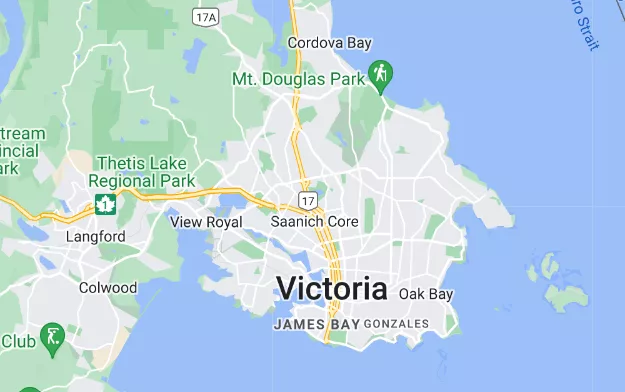By Dane Kingsbury PREC a Realtor with MacDonald Realty in Victoria, British Columbia, Canada
What’s it like living in Victoria?
It’s paradise! It barely rains in Victoria and people are super relaxed. You don’t get the kind of socked-in rainy days you do in Vancouver. It stops and starts, then it’s sunny. Plus, there’s so much to do – in any direction, you can find the water. You’re surrounded on all sides by beaches, inlets, lakes, and access to the Gulf Islands. You have the whole of Vancouver Island to explore. There is a decent mountain halfway up the island, too. We have it all.

Because it’s older, Victoria is not like your typical grid city (like Vancouver). There are more nodes like strips of small businesses (banks, grocers, cafes, bakeries) and boutique shops. Neighbourhoods are still very prevalent. Victoria is increasingly becoming a big city but still retaining its neighbourhood vibe. This definitely makes it feel personal.
I personally love the variety of beaches. Paddleboarding and fishing are easily accessible. There are tons of hiking and mountain biking trails. It’s small, so you’re only about 15 minutes from anything you need (though, it used to be 10 minutes)!
Biggest challenges about living in Victoria
The biggest challenge about Victoria is getting used to it. For example, it’s not uncommon for street names to change three times! Learning the lay of the land is different, as Victoria isn’t a grid-like city. It has many meandering roads and tons of parks.
As well, 13 municipalities actually make up what everyone knows as Victoria. From a real estate perspective, you need to understand and explain the differences between each municipality. It creates challenges from all perspectives. For instance, if a buyer needs a rental suite, they may need to avoid certain municipalities that are stricter about things like that. If you want farming status or horses, you need to know which areas to avoid. On the upside, you can have these things close to the city. For commuters, however, it can be challenging.
Victoria has a lot of old money and many people move there from other places. It’s not as pricey as Vancouver, but definitely not cheap like the east coast.
How Victoria is unique from other markets and cities
Victoria has historically been driven by government and university. There was a saying it’s for those who are “newlywed or nearly dead”, but this isn’t the case anymore. This can definitely be see with the new condo developments Victoria BC offers.
Many people leave after university and, at one time, maybe a few would return, but more and more people today are returning and starting families in Victoria.
The 30s age range is the fastest-growing demographic now, and with that comes an increase in duplexes, townhouses, and new construction of multi-family homes.
There is more densification, and downtown is becoming taller with more high rises. But, Victoria is still predominantly a single-family area and you don’t see as much infill housing as you do in larger cities across Canada.
Interestingly, a significantly higher percentage of people rent than own in Victoria (61% of Victoria households are rented, whereas in Vancouver it’s 51% and regionally it’s 34%*).
What to prepare for when moving to Victoria
Shopping is not as good in Victoria as it is in other cities like Toronto, Calgary or Vancouver. Recently, two malls underwent renovations, but there are fewer high-end stores than you’ll find elsewhere.
Victoria offers a relaxed pace of life – your commute should be shorter as you should be able to attain a home closer to work. There are lots of great bike-friendly trails, such as the Lochside Regional Trail from town up the peninsula, and the Galloping Goose Regional Trail through town up the island.
Victoria is really becoming more like Vancouver was 20 years ago: there are great restaurants, bakeries, and local shops for things like produce, meat, and farm-to-table food.
To get ready for your move to or investment in Victoria, have a look at our Victoria Real Estate Statistics page to get a feel for the market.
Recommended areas to live, for:
- Singles, young couples, and first-time buyers – Downtown is the most central, and areas like Cook Street Village, Vic West, and Esquimalt are gentrifying with a younger, active demographic. Young families also like Fairfield, and wealthier families are in South Oak Bay and up to Gordon Head.
- DINKs/couples with dual income & no kids and empty nesters – The same areas as above are great, where you can go out and take a short cab or walk home, like Fairfield. Oak Bay has an older demographic but also small, fun spots on Oak Bay Avenue. It’s all about walkability and access to things like bike routes or places within a short drive.
- Investors – Victoria’s investment is mostly for capital gains. There are still opportunities for cash flow but cap rates aren’t high. Low vacancy rates make it good if you’re looking for a longer-term investment as capital appreciation growth. This is easier to carry in Victoria and to make a little bit than it is in other cities like Toronto or Vancouver. Areas closer to the university or in and around the edge of town may net more income on houses since you can fit more people and renovate into multiple suites.
Want to read more about living in BC? Here are some related articles:
